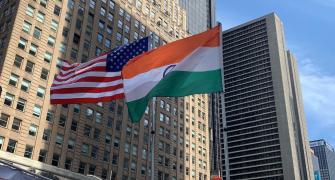 Indian information technology services firms like Tata Consultancy Services, Infosys Technologies and Wipro are gearing up to corner a chunk of large deals that are coming up for renewal over the next three months.
Indian information technology services firms like Tata Consultancy Services, Infosys Technologies and Wipro are gearing up to corner a chunk of large deals that are coming up for renewal over the next three months.
Deals worth $27 billion are up for renewal. Of these, almost $1.7 billion worth of contracts are currently with Indian services providers, said data from TPI.
Analysts are of the view that as deals are getting broken into silos (segments), Indian IT services firms will get aggressive to corner these.
"In approximately 90 per cent of the cases, the incumbent manages to hold on to a substantial portion (though not all) of the contract scope.
"Other firms sometimes get parts of the newly broken up contracts," said Siddarth Pai, Partner & Managing Director, TPI India.
He said in several of the deals that are getting broken into silos, Indian players are gaining share. It is a fact that with the total contract value declining, Indian IT firms and MNCs are increasingly becoming competitive for the deals that are in the range of $25 million to $199 million.
Rather, a TPI study said, over the next five years will bring head-to-head battles and will also intensify competition at all TCV levels.
Agrees Partha Iyengar of Gartner, "The majority of the new deals will have this trend, since clients are concerned about their ability to manage these mega/long-term deals over time, and are favouring smaller deals (comparatively) with a slightly larger number of providers.
"In fact, a big part of the reason for the smaller contract sizes is to bring the Indian providers into these deals so that clients benefit from their global delivery capabilities," said Iyengar.
The ABN Amro deal signed a few years back is an example of this trend. In 2005, ABN Amro outsourced its IT operations to five IT vendors in a $2-billion deal.
While IBM managed to gain the maximum share with ¤1.5 billion, the deal also had firms like Accenture, Tata Consultancy Services, Infosys Technologies and Patni Computer Systems.
This was to help ABN Amro save at least ¤258 million from 2007.
Similarly, General Motors a couple of years, instead of continuing with the incumbent vendor EDS, choose to divide the contract. Among the other MNCs, India's third largest IT services firm Wipro had bagged $300 million deal.
Analysts maintain that while Indian players are gaining entry into the large bids, it is not necessary that they will always be preferred one.
"For the deals which are more 'tech intensive' (eg. application maintenance/support, lower end app development deals) the Indian providers typically have a better offering.
For the high-end deals, where business and domain skills requirements are higher, the MNCs have an advantage. At the end of the day it will depend on who can position their overall capabilities in front of their clients better," said Iyengar.
Industry experts also point to the BP (British Petroleum) deal signed in August 2009.
"Even though BP went in for consolidation 82 contracts among 40 vendors to five. Other than IBM and HP, it was the top three Indian IT firms that managed to get a share in this. So Indian IT firms have clearly started to challenge the MNCs," said an senior executive of an IT services firm.
The deal was significant as it was to give BP 30-35 per cent cost savings over a five-year period.
Another reason for Indian IT firms to be able to compete with MNCs is that there is no longer a differentiated (traditional vs offshore) model.
"Global sourcing has become mainstream and everyone is expected to quote an appropriate global delivery model and capability in their responses to clients.
"So, the short-lists no longer differentiate between the global MNCs and the Indian providers, and they are more often than not on the same short-list and competing for the same deals," added Iyengar.
IBM, HP, Accenture and Capgemini have created a strong offshore centre in India with a headcount growth at par with the top Indian firms. For instance, for IBM, its India headcount is over 100,000 of its total base of 399,409.
For Accenture, the India centre has more employees when compared to its US headquarters.
"So, clearly, the offshore strategy is no more a trump card for Indian players. But what Indian providers do provide is better flexibility and transparency," adds an analyst.








